Ethics and Governance Issues: A Case Study of ABC Learning Collapse
VerifiedAdded on 2023/06/07
|6
|1987
|318
Case Study
AI Summary
This case study delves into the ethical and social responsibility failures that contributed to the collapse of ABC Learning, an Australian corporation specializing in childcare services. The analysis reveals a complex interplay of factors, including aggressive expansion strategies, inadequate corporate governance, manipulated accounts, and a lack of transparency. Key issues identified encompass unethical business operations, a utilitarian approach to ethics that prioritized outcomes over values, and a failure to balance profit maximization with social responsibility. The study further highlights the absence of robust corporate governance systems, oversight vision, and adherence to professional standards, particularly in financial reporting. Lessons learned from the ABC Learning collapse emphasize the importance of sustainable growth, ethical management, transparent accounting practices, and effective corporate governance to maintain investor confidence and ensure long-term business viability. Desklib provides access to similar case studies and solved assignments for students.
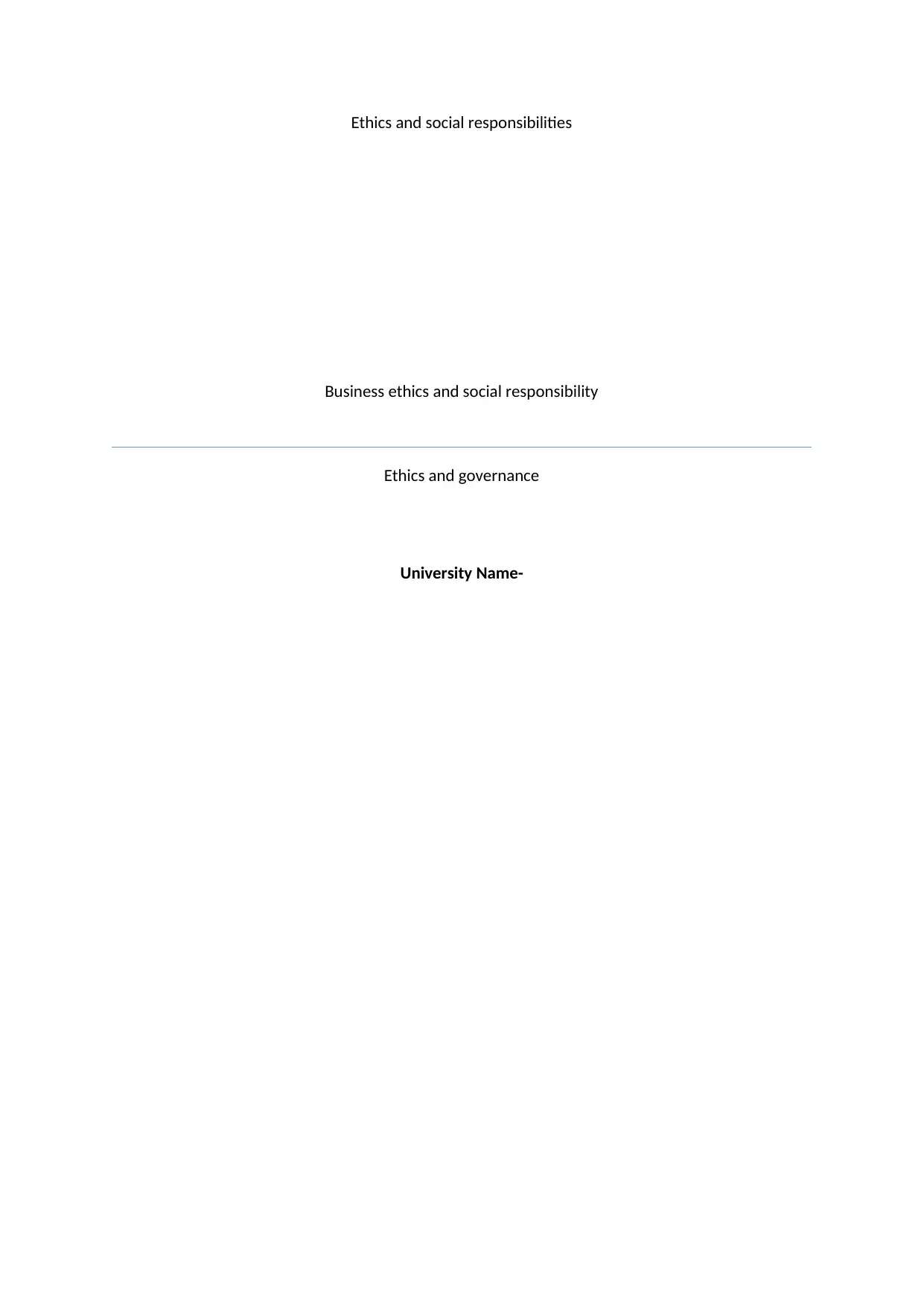
Ethics and social responsibilities
Business ethics and social responsibility
Ethics and governance
University Name-
Business ethics and social responsibility
Ethics and governance
University Name-
Paraphrase This Document
Need a fresh take? Get an instant paraphrase of this document with our AI Paraphraser
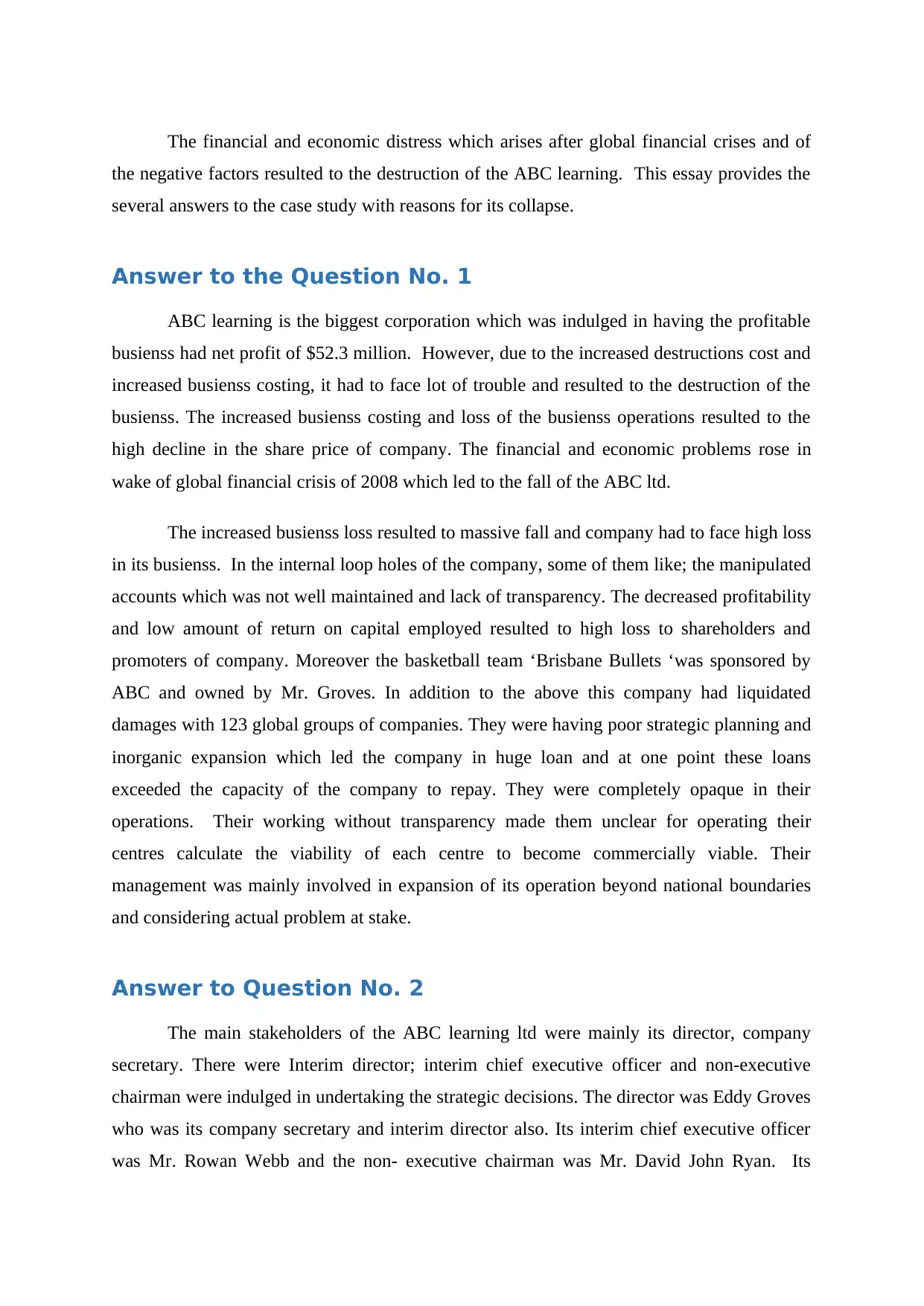
The financial and economic distress which arises after global financial crises and of
the negative factors resulted to the destruction of the ABC learning. This essay provides the
several answers to the case study with reasons for its collapse.
Answer to the Question No. 1
ABC learning is the biggest corporation which was indulged in having the profitable
busienss had net profit of $52.3 million. However, due to the increased destructions cost and
increased busienss costing, it had to face lot of trouble and resulted to the destruction of the
busienss. The increased busienss costing and loss of the busienss operations resulted to the
high decline in the share price of company. The financial and economic problems rose in
wake of global financial crisis of 2008 which led to the fall of the ABC ltd.
The increased busienss loss resulted to massive fall and company had to face high loss
in its busienss. In the internal loop holes of the company, some of them like; the manipulated
accounts which was not well maintained and lack of transparency. The decreased profitability
and low amount of return on capital employed resulted to high loss to shareholders and
promoters of company. Moreover the basketball team ‘Brisbane Bullets ‘was sponsored by
ABC and owned by Mr. Groves. In addition to the above this company had liquidated
damages with 123 global groups of companies. They were having poor strategic planning and
inorganic expansion which led the company in huge loan and at one point these loans
exceeded the capacity of the company to repay. They were completely opaque in their
operations. Their working without transparency made them unclear for operating their
centres calculate the viability of each centre to become commercially viable. Their
management was mainly involved in expansion of its operation beyond national boundaries
and considering actual problem at stake.
Answer to Question No. 2
The main stakeholders of the ABC learning ltd were mainly its director, company
secretary. There were Interim director; interim chief executive officer and non-executive
chairman were indulged in undertaking the strategic decisions. The director was Eddy Groves
who was its company secretary and interim director also. Its interim chief executive officer
was Mr. Rowan Webb and the non- executive chairman was Mr. David John Ryan. Its
the negative factors resulted to the destruction of the ABC learning. This essay provides the
several answers to the case study with reasons for its collapse.
Answer to the Question No. 1
ABC learning is the biggest corporation which was indulged in having the profitable
busienss had net profit of $52.3 million. However, due to the increased destructions cost and
increased busienss costing, it had to face lot of trouble and resulted to the destruction of the
busienss. The increased busienss costing and loss of the busienss operations resulted to the
high decline in the share price of company. The financial and economic problems rose in
wake of global financial crisis of 2008 which led to the fall of the ABC ltd.
The increased busienss loss resulted to massive fall and company had to face high loss
in its busienss. In the internal loop holes of the company, some of them like; the manipulated
accounts which was not well maintained and lack of transparency. The decreased profitability
and low amount of return on capital employed resulted to high loss to shareholders and
promoters of company. Moreover the basketball team ‘Brisbane Bullets ‘was sponsored by
ABC and owned by Mr. Groves. In addition to the above this company had liquidated
damages with 123 global groups of companies. They were having poor strategic planning and
inorganic expansion which led the company in huge loan and at one point these loans
exceeded the capacity of the company to repay. They were completely opaque in their
operations. Their working without transparency made them unclear for operating their
centres calculate the viability of each centre to become commercially viable. Their
management was mainly involved in expansion of its operation beyond national boundaries
and considering actual problem at stake.
Answer to Question No. 2
The main stakeholders of the ABC learning ltd were mainly its director, company
secretary. There were Interim director; interim chief executive officer and non-executive
chairman were indulged in undertaking the strategic decisions. The director was Eddy Groves
who was its company secretary and interim director also. Its interim chief executive officer
was Mr. Rowan Webb and the non- executive chairman was Mr. David John Ryan. Its
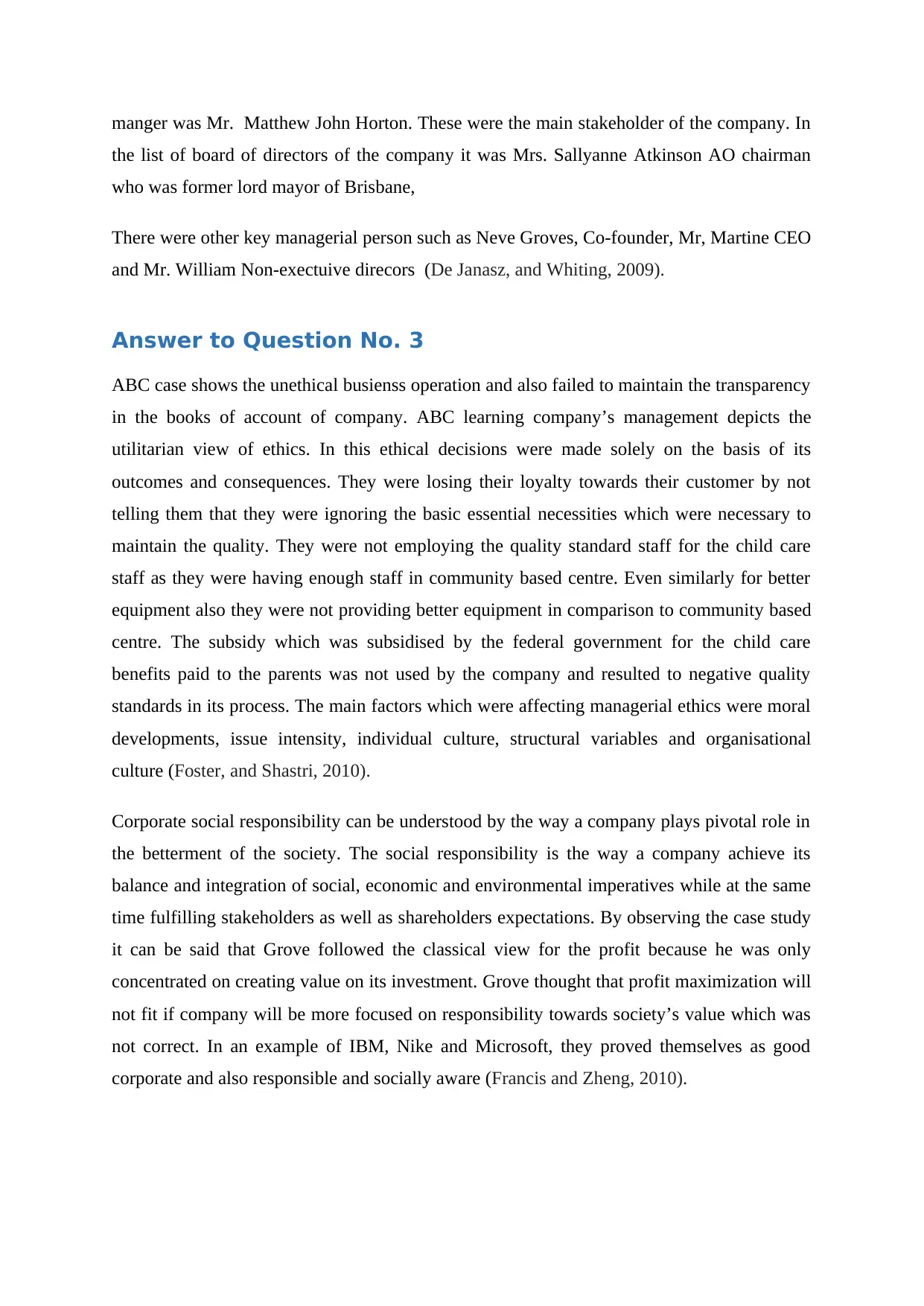
manger was Mr. Matthew John Horton. These were the main stakeholder of the company. In
the list of board of directors of the company it was Mrs. Sallyanne Atkinson AO chairman
who was former lord mayor of Brisbane,
There were other key managerial person such as Neve Groves, Co-founder, Mr, Martine CEO
and Mr. William Non-exectuive direcors (De Janasz, and Whiting, 2009).
Answer to Question No. 3
ABC case shows the unethical busienss operation and also failed to maintain the transparency
in the books of account of company. ABC learning company’s management depicts the
utilitarian view of ethics. In this ethical decisions were made solely on the basis of its
outcomes and consequences. They were losing their loyalty towards their customer by not
telling them that they were ignoring the basic essential necessities which were necessary to
maintain the quality. They were not employing the quality standard staff for the child care
staff as they were having enough staff in community based centre. Even similarly for better
equipment also they were not providing better equipment in comparison to community based
centre. The subsidy which was subsidised by the federal government for the child care
benefits paid to the parents was not used by the company and resulted to negative quality
standards in its process. The main factors which were affecting managerial ethics were moral
developments, issue intensity, individual culture, structural variables and organisational
culture (Foster, and Shastri, 2010).
Corporate social responsibility can be understood by the way a company plays pivotal role in
the betterment of the society. The social responsibility is the way a company achieve its
balance and integration of social, economic and environmental imperatives while at the same
time fulfilling stakeholders as well as shareholders expectations. By observing the case study
it can be said that Grove followed the classical view for the profit because he was only
concentrated on creating value on its investment. Grove thought that profit maximization will
not fit if company will be more focused on responsibility towards society’s value which was
not correct. In an example of IBM, Nike and Microsoft, they proved themselves as good
corporate and also responsible and socially aware (Francis and Zheng, 2010).
the list of board of directors of the company it was Mrs. Sallyanne Atkinson AO chairman
who was former lord mayor of Brisbane,
There were other key managerial person such as Neve Groves, Co-founder, Mr, Martine CEO
and Mr. William Non-exectuive direcors (De Janasz, and Whiting, 2009).
Answer to Question No. 3
ABC case shows the unethical busienss operation and also failed to maintain the transparency
in the books of account of company. ABC learning company’s management depicts the
utilitarian view of ethics. In this ethical decisions were made solely on the basis of its
outcomes and consequences. They were losing their loyalty towards their customer by not
telling them that they were ignoring the basic essential necessities which were necessary to
maintain the quality. They were not employing the quality standard staff for the child care
staff as they were having enough staff in community based centre. Even similarly for better
equipment also they were not providing better equipment in comparison to community based
centre. The subsidy which was subsidised by the federal government for the child care
benefits paid to the parents was not used by the company and resulted to negative quality
standards in its process. The main factors which were affecting managerial ethics were moral
developments, issue intensity, individual culture, structural variables and organisational
culture (Foster, and Shastri, 2010).
Corporate social responsibility can be understood by the way a company plays pivotal role in
the betterment of the society. The social responsibility is the way a company achieve its
balance and integration of social, economic and environmental imperatives while at the same
time fulfilling stakeholders as well as shareholders expectations. By observing the case study
it can be said that Grove followed the classical view for the profit because he was only
concentrated on creating value on its investment. Grove thought that profit maximization will
not fit if company will be more focused on responsibility towards society’s value which was
not correct. In an example of IBM, Nike and Microsoft, they proved themselves as good
corporate and also responsible and socially aware (Francis and Zheng, 2010).
⊘ This is a preview!⊘
Do you want full access?
Subscribe today to unlock all pages.

Trusted by 1+ million students worldwide
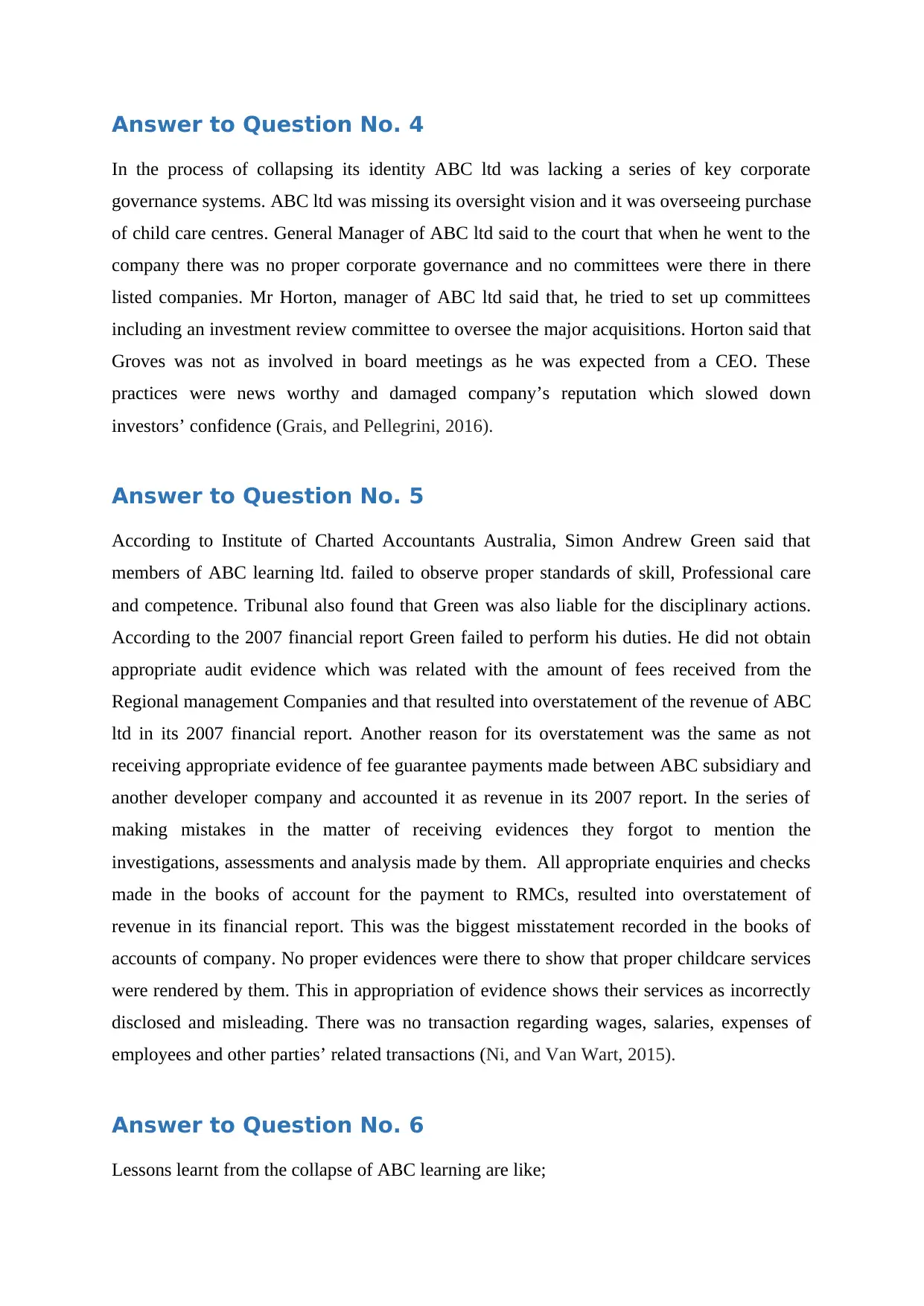
Answer to Question No. 4
In the process of collapsing its identity ABC ltd was lacking a series of key corporate
governance systems. ABC ltd was missing its oversight vision and it was overseeing purchase
of child care centres. General Manager of ABC ltd said to the court that when he went to the
company there was no proper corporate governance and no committees were there in there
listed companies. Mr Horton, manager of ABC ltd said that, he tried to set up committees
including an investment review committee to oversee the major acquisitions. Horton said that
Groves was not as involved in board meetings as he was expected from a CEO. These
practices were news worthy and damaged company’s reputation which slowed down
investors’ confidence (Grais, and Pellegrini, 2016).
Answer to Question No. 5
According to Institute of Charted Accountants Australia, Simon Andrew Green said that
members of ABC learning ltd. failed to observe proper standards of skill, Professional care
and competence. Tribunal also found that Green was also liable for the disciplinary actions.
According to the 2007 financial report Green failed to perform his duties. He did not obtain
appropriate audit evidence which was related with the amount of fees received from the
Regional management Companies and that resulted into overstatement of the revenue of ABC
ltd in its 2007 financial report. Another reason for its overstatement was the same as not
receiving appropriate evidence of fee guarantee payments made between ABC subsidiary and
another developer company and accounted it as revenue in its 2007 report. In the series of
making mistakes in the matter of receiving evidences they forgot to mention the
investigations, assessments and analysis made by them. All appropriate enquiries and checks
made in the books of account for the payment to RMCs, resulted into overstatement of
revenue in its financial report. This was the biggest misstatement recorded in the books of
accounts of company. No proper evidences were there to show that proper childcare services
were rendered by them. This in appropriation of evidence shows their services as incorrectly
disclosed and misleading. There was no transaction regarding wages, salaries, expenses of
employees and other parties’ related transactions (Ni, and Van Wart, 2015).
Answer to Question No. 6
Lessons learnt from the collapse of ABC learning are like;
In the process of collapsing its identity ABC ltd was lacking a series of key corporate
governance systems. ABC ltd was missing its oversight vision and it was overseeing purchase
of child care centres. General Manager of ABC ltd said to the court that when he went to the
company there was no proper corporate governance and no committees were there in there
listed companies. Mr Horton, manager of ABC ltd said that, he tried to set up committees
including an investment review committee to oversee the major acquisitions. Horton said that
Groves was not as involved in board meetings as he was expected from a CEO. These
practices were news worthy and damaged company’s reputation which slowed down
investors’ confidence (Grais, and Pellegrini, 2016).
Answer to Question No. 5
According to Institute of Charted Accountants Australia, Simon Andrew Green said that
members of ABC learning ltd. failed to observe proper standards of skill, Professional care
and competence. Tribunal also found that Green was also liable for the disciplinary actions.
According to the 2007 financial report Green failed to perform his duties. He did not obtain
appropriate audit evidence which was related with the amount of fees received from the
Regional management Companies and that resulted into overstatement of the revenue of ABC
ltd in its 2007 financial report. Another reason for its overstatement was the same as not
receiving appropriate evidence of fee guarantee payments made between ABC subsidiary and
another developer company and accounted it as revenue in its 2007 report. In the series of
making mistakes in the matter of receiving evidences they forgot to mention the
investigations, assessments and analysis made by them. All appropriate enquiries and checks
made in the books of account for the payment to RMCs, resulted into overstatement of
revenue in its financial report. This was the biggest misstatement recorded in the books of
accounts of company. No proper evidences were there to show that proper childcare services
were rendered by them. This in appropriation of evidence shows their services as incorrectly
disclosed and misleading. There was no transaction regarding wages, salaries, expenses of
employees and other parties’ related transactions (Ni, and Van Wart, 2015).
Answer to Question No. 6
Lessons learnt from the collapse of ABC learning are like;
Paraphrase This Document
Need a fresh take? Get an instant paraphrase of this document with our AI Paraphraser
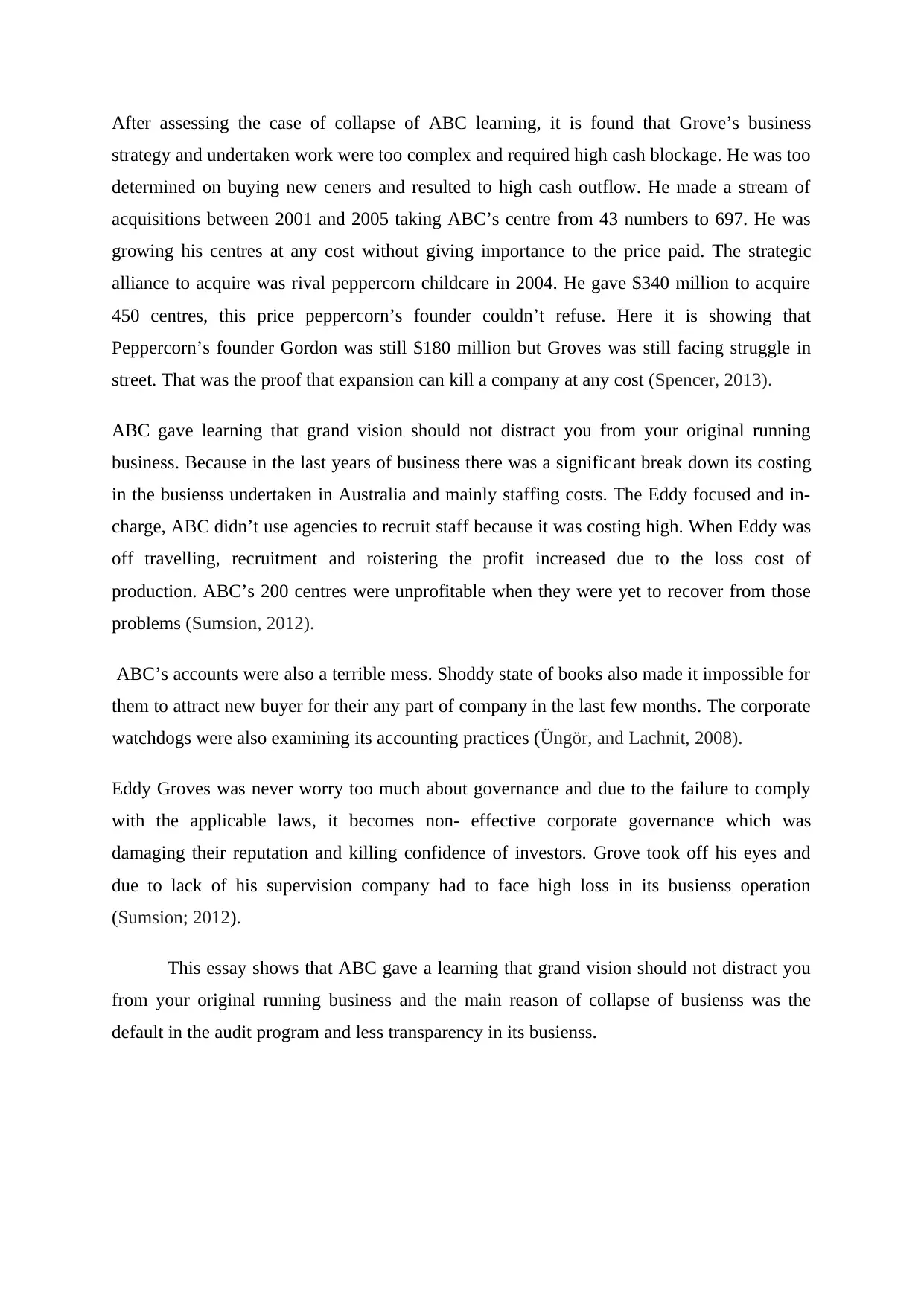
After assessing the case of collapse of ABC learning, it is found that Grove’s business
strategy and undertaken work were too complex and required high cash blockage. He was too
determined on buying new ceners and resulted to high cash outflow. He made a stream of
acquisitions between 2001 and 2005 taking ABC’s centre from 43 numbers to 697. He was
growing his centres at any cost without giving importance to the price paid. The strategic
alliance to acquire was rival peppercorn childcare in 2004. He gave $340 million to acquire
450 centres, this price peppercorn’s founder couldn’t refuse. Here it is showing that
Peppercorn’s founder Gordon was still $180 million but Groves was still facing struggle in
street. That was the proof that expansion can kill a company at any cost (Spencer, 2013).
ABC gave learning that grand vision should not distract you from your original running
business. Because in the last years of business there was a significant break down its costing
in the busienss undertaken in Australia and mainly staffing costs. The Eddy focused and in-
charge, ABC didn’t use agencies to recruit staff because it was costing high. When Eddy was
off travelling, recruitment and roistering the profit increased due to the loss cost of
production. ABC’s 200 centres were unprofitable when they were yet to recover from those
problems (Sumsion, 2012).
ABC’s accounts were also a terrible mess. Shoddy state of books also made it impossible for
them to attract new buyer for their any part of company in the last few months. The corporate
watchdogs were also examining its accounting practices (Üngör, and Lachnit, 2008).
Eddy Groves was never worry too much about governance and due to the failure to comply
with the applicable laws, it becomes non- effective corporate governance which was
damaging their reputation and killing confidence of investors. Grove took off his eyes and
due to lack of his supervision company had to face high loss in its busienss operation
(Sumsion; 2012).
This essay shows that ABC gave a learning that grand vision should not distract you
from your original running business and the main reason of collapse of busienss was the
default in the audit program and less transparency in its busienss.
strategy and undertaken work were too complex and required high cash blockage. He was too
determined on buying new ceners and resulted to high cash outflow. He made a stream of
acquisitions between 2001 and 2005 taking ABC’s centre from 43 numbers to 697. He was
growing his centres at any cost without giving importance to the price paid. The strategic
alliance to acquire was rival peppercorn childcare in 2004. He gave $340 million to acquire
450 centres, this price peppercorn’s founder couldn’t refuse. Here it is showing that
Peppercorn’s founder Gordon was still $180 million but Groves was still facing struggle in
street. That was the proof that expansion can kill a company at any cost (Spencer, 2013).
ABC gave learning that grand vision should not distract you from your original running
business. Because in the last years of business there was a significant break down its costing
in the busienss undertaken in Australia and mainly staffing costs. The Eddy focused and in-
charge, ABC didn’t use agencies to recruit staff because it was costing high. When Eddy was
off travelling, recruitment and roistering the profit increased due to the loss cost of
production. ABC’s 200 centres were unprofitable when they were yet to recover from those
problems (Sumsion, 2012).
ABC’s accounts were also a terrible mess. Shoddy state of books also made it impossible for
them to attract new buyer for their any part of company in the last few months. The corporate
watchdogs were also examining its accounting practices (Üngör, and Lachnit, 2008).
Eddy Groves was never worry too much about governance and due to the failure to comply
with the applicable laws, it becomes non- effective corporate governance which was
damaging their reputation and killing confidence of investors. Grove took off his eyes and
due to lack of his supervision company had to face high loss in its busienss operation
(Sumsion; 2012).
This essay shows that ABC gave a learning that grand vision should not distract you
from your original running business and the main reason of collapse of busienss was the
default in the audit program and less transparency in its busienss.
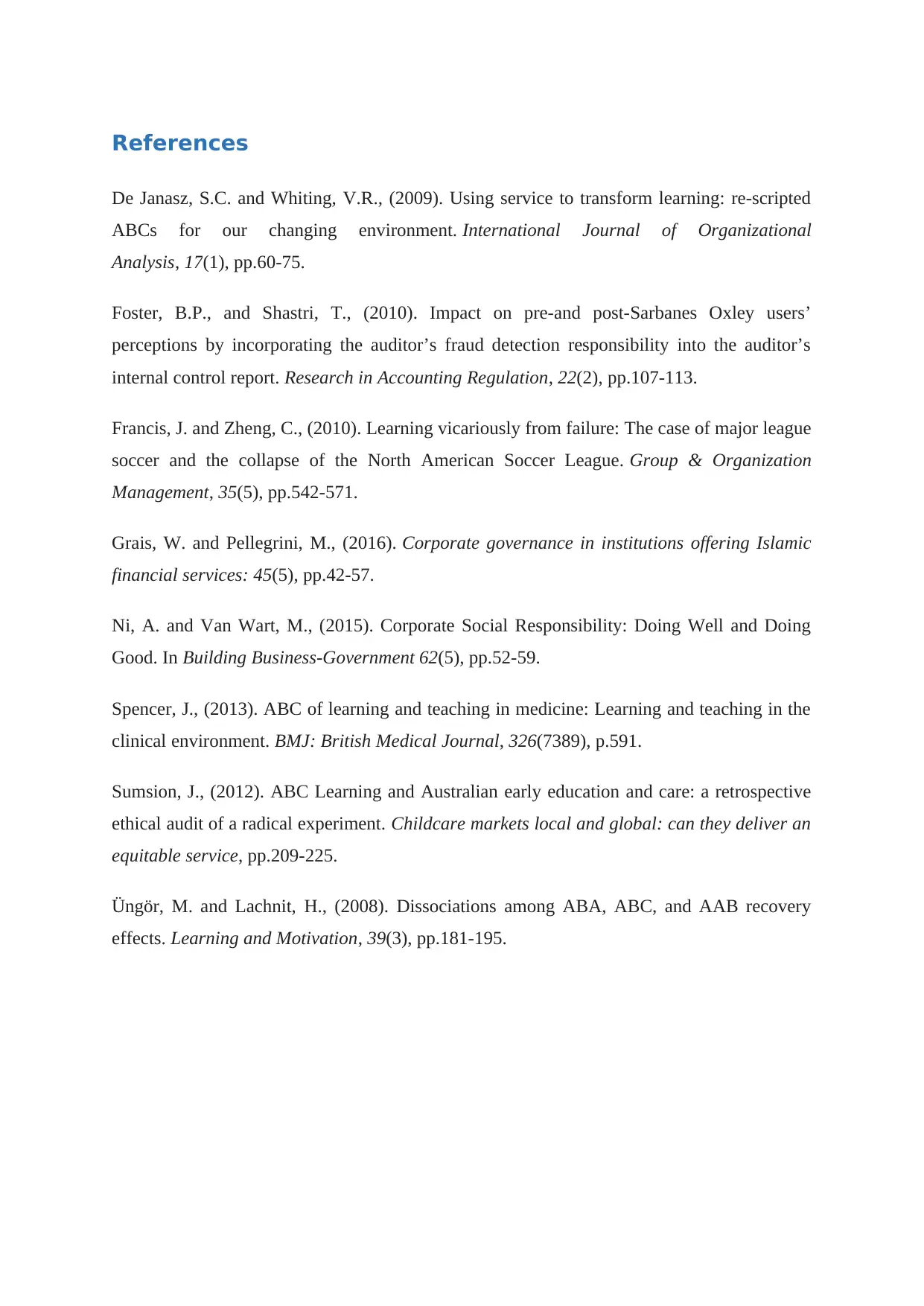
References
De Janasz, S.C. and Whiting, V.R., (2009). Using service to transform learning: re-scripted
ABCs for our changing environment. International Journal of Organizational
Analysis, 17(1), pp.60-75.
Foster, B.P., and Shastri, T., (2010). Impact on pre-and post-Sarbanes Oxley users’
perceptions by incorporating the auditor’s fraud detection responsibility into the auditor’s
internal control report. Research in Accounting Regulation, 22(2), pp.107-113.
Francis, J. and Zheng, C., (2010). Learning vicariously from failure: The case of major league
soccer and the collapse of the North American Soccer League. Group & Organization
Management, 35(5), pp.542-571.
Grais, W. and Pellegrini, M., (2016). Corporate governance in institutions offering Islamic
financial services: 45(5), pp.42-57.
Ni, A. and Van Wart, M., (2015). Corporate Social Responsibility: Doing Well and Doing
Good. In Building Business-Government 62(5), pp.52-59.
Spencer, J., (2013). ABC of learning and teaching in medicine: Learning and teaching in the
clinical environment. BMJ: British Medical Journal, 326(7389), p.591.
Sumsion, J., (2012). ABC Learning and Australian early education and care: a retrospective
ethical audit of a radical experiment. Childcare markets local and global: can they deliver an
equitable service, pp.209-225.
Üngör, M. and Lachnit, H., (2008). Dissociations among ABA, ABC, and AAB recovery
effects. Learning and Motivation, 39(3), pp.181-195.
De Janasz, S.C. and Whiting, V.R., (2009). Using service to transform learning: re-scripted
ABCs for our changing environment. International Journal of Organizational
Analysis, 17(1), pp.60-75.
Foster, B.P., and Shastri, T., (2010). Impact on pre-and post-Sarbanes Oxley users’
perceptions by incorporating the auditor’s fraud detection responsibility into the auditor’s
internal control report. Research in Accounting Regulation, 22(2), pp.107-113.
Francis, J. and Zheng, C., (2010). Learning vicariously from failure: The case of major league
soccer and the collapse of the North American Soccer League. Group & Organization
Management, 35(5), pp.542-571.
Grais, W. and Pellegrini, M., (2016). Corporate governance in institutions offering Islamic
financial services: 45(5), pp.42-57.
Ni, A. and Van Wart, M., (2015). Corporate Social Responsibility: Doing Well and Doing
Good. In Building Business-Government 62(5), pp.52-59.
Spencer, J., (2013). ABC of learning and teaching in medicine: Learning and teaching in the
clinical environment. BMJ: British Medical Journal, 326(7389), p.591.
Sumsion, J., (2012). ABC Learning and Australian early education and care: a retrospective
ethical audit of a radical experiment. Childcare markets local and global: can they deliver an
equitable service, pp.209-225.
Üngör, M. and Lachnit, H., (2008). Dissociations among ABA, ABC, and AAB recovery
effects. Learning and Motivation, 39(3), pp.181-195.
⊘ This is a preview!⊘
Do you want full access?
Subscribe today to unlock all pages.

Trusted by 1+ million students worldwide
1 out of 6
Related Documents
Your All-in-One AI-Powered Toolkit for Academic Success.
+13062052269
info@desklib.com
Available 24*7 on WhatsApp / Email
![[object Object]](/_next/static/media/star-bottom.7253800d.svg)
Unlock your academic potential
Copyright © 2020–2026 A2Z Services. All Rights Reserved. Developed and managed by ZUCOL.





